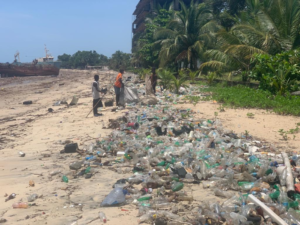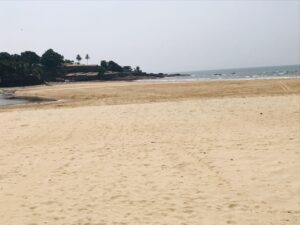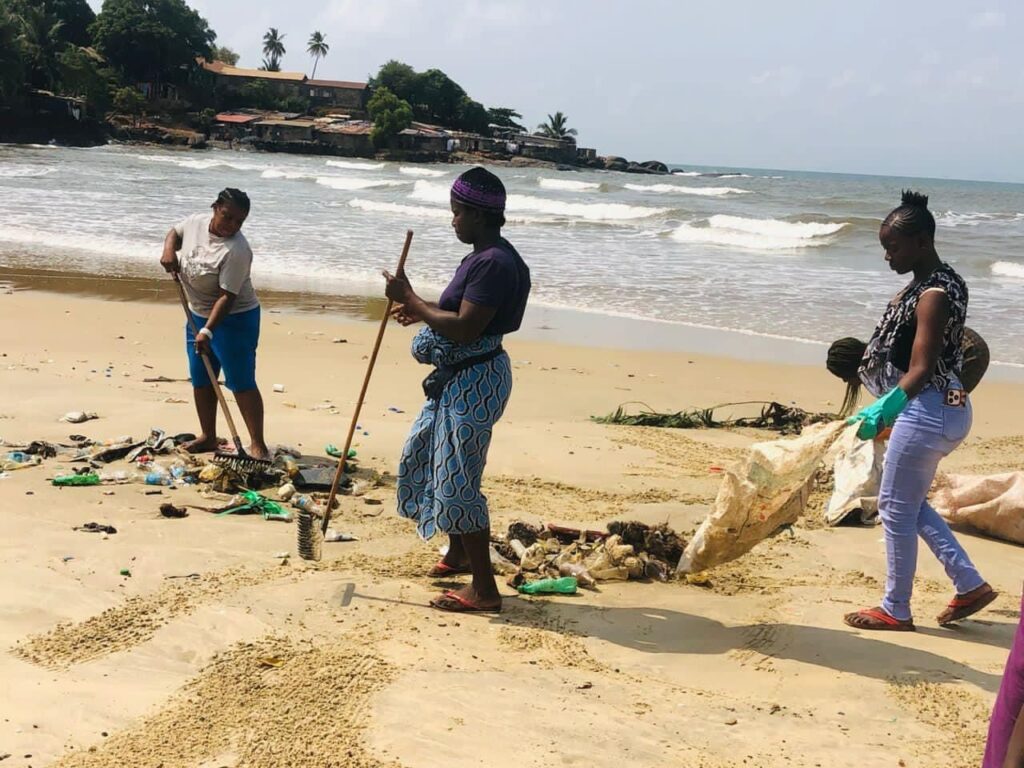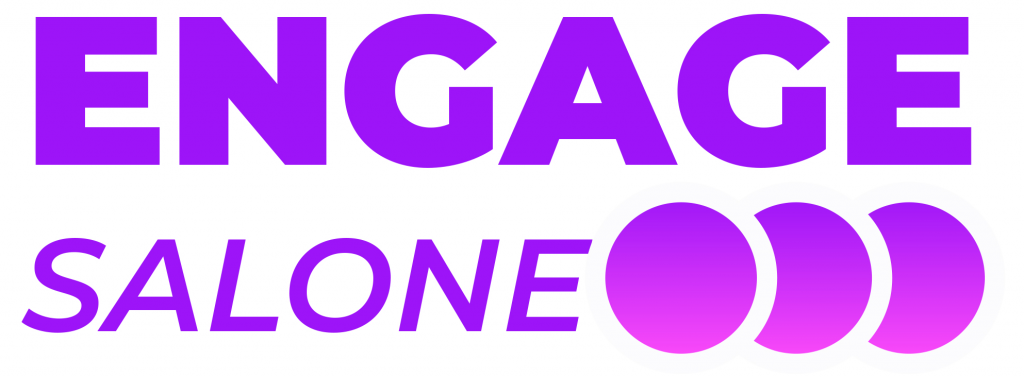On a cool Thursday morning, just as the sun rises over Freetown and the heat peaks, about 45 women gather along Lumley Beach. They have taken on the onerous and elaborate job of cleaning up the beach, which has become an unsightly graveyard of all manner of plastic waste, from empty bottles and sachets to household items and even medical waste. They work with a local group called Propel Organization as part of their sustainable zero-plastic waste project. It’s the third year since they set out to serve Sierra Leone through environmental and climate-friendly initiatives. The women are recruited from the surrounding communities, and cleaning the beaches off seaweed and plastic waste has become their full-time job.
Gibril Conteh, commonly called ‘Jordan’, supervises the beach cleaners who turn up every day to pick up plastic and seaweed. Jordan says they took up the challenge because a lot of plastic waste ends up in the sea, threatening the lives of sea creatures and, by extension, the people who consume this seafood.
Cleaning the beaches today is an uphill task on a flat land. Jordan and his team collect a huge pile of about 300 bags of plastic and other waste daily. The amount of rubbish they have to collect is one of the group’s biggest challenges, Jordan told Engage Salone.
Waste management efforts do not seem to be matching the growing inflow of plastic. Plastic turns over around 40,600 tonnes of waste annually.

According to the Ocean Plastic Forum, about 80% of this figure is dumped on streets and rivers, where it makes its way to coastal communities and then the sea. This makes the beach cleaning exercise a hardly progressive venture.
“Sometimes our cleaning exercise is just back and forth because before we reach an endpoint for the day, all of the waste deposited at sea would come back to the shore where we have cleaned, cancelling our work”, Jordan lamented. Sometimes, Jordan and the group of women come back the next day only to find the entire beach covered in plastic and all sorts of garbage. It’s almost like time wasted, no work done.
Marina Koroma, one of the women working on Propel Organization’s beach cleaning, described their work as “very challenging”.
“We clean the beaches all the time, but people still dispose of waste in places where they get swept into the sea. The sea returns the waste to the beaches, and we have a pile of plastic waste to deal with every day”, she said. Marina added that the story was the same in all the communities they work in.
For this reason, the organisation has a support staff of 20 men who work in the afternoon hours to clean the areas that had been cleaned in the morning but were covered by dirt a couple of hours later.
The supervisor, Jordan, believes that the attitude of people living in the city is another major problem. He said people litter the beaches with plastic waste even though trash cans are available for proper disposal. “If this attitude could change, maybe things would get better,” he said with little hope.
Keeping Freetown’s beaches clean is a complex problem that requires much more than cleaning, which Jordan and his team do daily. It is a waste management problem that needs a holistic approach with all hands on deck. The team at Propel feel lonely in their work as they have only succeeded in getting “minimal support” from the authorities.
“The Tourist Board helps us occasionally – though their focus is more on street cleaning. As for the Freetown City Council, they have not shown interest in what we do despite a couple of attempts we’ve made to get their support”.
Jordan said the authorities haven’t done enough regarding waste management in the city. “They need to double their efforts in terms of strategies, policies and human resources”, he said.
Jordan told Engage Salone that supporting them with basic tools and public education campaigns would make a lot of difference in their work.

The plastic menace is also taking a toll on the livelihoods of fishermen who complain that plastic waste at sea causes many problems for their fishing boats and nets and contributes to their low catch.
Sierra Leone has a small plastic-producing industry that produces about 8,750 metric tonnes of plastic products annually. However, the country imports a huge volume of plastic from Ghana, its leading supplier and other markets, according to a 2019 study titled Plastic Waste Inputs from Land into the Sea. The study revealed that in 2019 alone, nine million kilograms of plastic entered the country as imports.
With no law in place to deter indiscriminate dumping of plastic waste, the awful practice continues to affect many aspects of life—at sea and onshore.
“If measures are not taken, we will continue to be affected by the impact of uncontrolled plastic waste”, Jordan said.
The Director of Natural Resource Governance at the Environmental Protection Agency, Paul Lamin, concedes that Sierra Leone has poor waste management, especially in the capital city.
“If you observe the beaches and the coastal areas, the amount of waste you see there tells you the magnitude of the problem we are having, which stems from waste management”, he told Engage Salone.
Lamin said sources of plastic such as factories comply with the regulations set in the Environmental Impact Assessment licence by the EPA. However, plastic waste still ends up at sea either by humans depositing it there or through run-off when it rains.
He said the absence of facilities such as a landfill where waste can be properly treated or recycled makes the challenge a huge one at this point.
“In the absence of a law governing plastic usage, we have formulated the 2022 Plastic Policy. Its objectives are assessing the extent of plastic waste in the country and using that to inform actions”, Lamin said.
“To mitigate the impact of plastic pollution, it is important to implement effective waste management practices, such as proper waste disposal and recycling, to prevent plastic waste from entering waterways. Additionally, promoting awareness and education about the importance of reducing plastic consumption and adopting sustainable alternatives can help address the issue of plastic pollution at its source,” Propel Organization wrote in a social media post.
Note: The interview with Gibril Conteh (Jordan) was conducted in October 2023.
About The Author
- Ibrahim Mansarayhttps://staging.engagesalone.org/author/ibrahim-mansaray/
- Ibrahim Mansarayhttps://staging.engagesalone.org/author/ibrahim-mansaray/
- Ibrahim Mansarayhttps://staging.engagesalone.org/author/ibrahim-mansaray/


